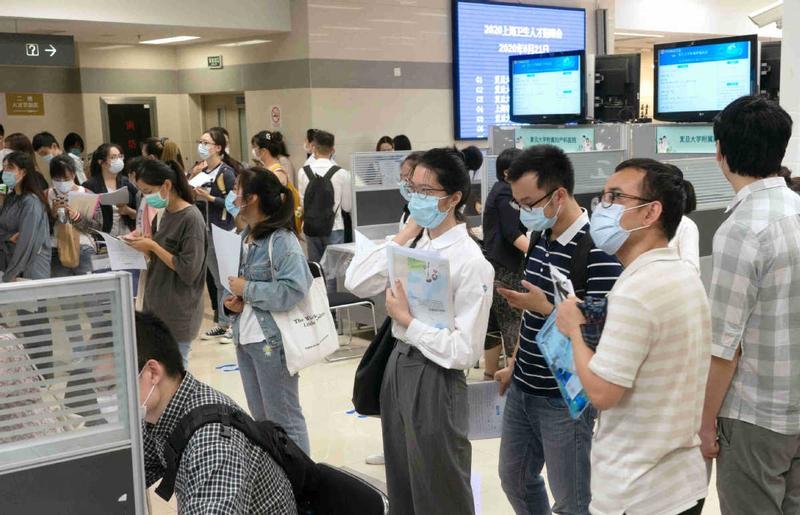How China is scrambling to find jobs amid COVID-19 for 9 million college graduates
In May, China's Ministry of Education unveiled a "One-Hundred Day Project" to help this year's college graduates find employment in one of the worst job markets in recent history. But serious challenges remain.

This summer, 8.74 million Chinese students are set to graduate from universities and enter into one of the worst job markets in recent memory. In late May, China’s top leaders pledged to “use all possible means” to ensure a stable job market, setting a target of 9 million new jobs this year.
As part of those means, China’s Ministry of Education launched a 100-day campaign on May 6 — called the One-Hundred Day Project — to help newly minted college graduates find employment. The campaign includes finding positions in state-owned enterprises (SOEs) and drafting more graduates into the military.
The project has introduced preferential policies like increasing bonuses to boost army enlistment. College graduates will receive priority for enlistments and receive a school tuition reimbursement of up to 8,000 yuan ($1,126) per year.
China has long sought to diversify its army, which primarily consists of young men from rural provinces without a college degree. Indeed, this is not the first time China has solved a job crisis through military recruiting. After a steep job downturn resulting from the global financial crisis in 2009, the People’s Liberation Army recruited more than 130,000 graduates, offering a one-time rebate of up to 24,000 yuan ($3,500) on college tuition fees.
The government has also encouraged companies to extend their recruitment seasons, although many (mostly private) businesses remain reluctant to recruit new graduates.
China’s SOEs, however, are taking on record numbers. Sinopec, a Chinese oil and gas giant, is hiring another 3,500 students atop the nearly 6,600 recruits it has already taken on — the most hires it has ever welcomed in a calendar year.
In Wuhan, the city hit hardest by COVID-19, authorities will allocate 250,000 new job positions for college graduates. The first in-person career fair in Wuhan since the start of the pandemic was held on June 1, with more than 80 companies participating and 2,500 job vacancies offered. Per the state-owned China Global Television Network, 60% of SOE job vacancies in Wuhan will be specifically reserved for this year’s college graduates, although such a stipulation potentially leaves the futures of middle-aged and other experienced, furloughed workers in limbo.
Beijing has long sought to reform its often inefficient SOEs by encouraging private-sector employment. But a burgeoning state bureaucracy, in conjunction with declining recruitment from private companies, could partially reverse this trend.
But China’s most recent unemployment statistics — while deemed inexact by many economists — underscore the daunting challenge for Beijing that lays ahead: Nearly 14% of people between the ages of 16 and 24 are jobless, a figure that doubles the unemployment rate of China as a whole.
22-year-old Lin Xinyu, a recent computer science graduate, told the New York Times that he elected not to pursue a job at a large private enterprise like Tencent, the prestigious Chinese internet giant. In today’s job market, Lin believed, the importance of stability and security outweighed prestige or career advancement.
“The larger private enterprises like Tencent, their probability of closing down might be something like 0.00001, but it’s nothing compared to state-owned enterprises,” Lin said.
Per a recent survey of 3,000 university graduates by the recruitment platform Liepin, three-quarters of respondents said they expected to earn less than $1,100 a month, one of the lowest salary ranges in the survey.
On Chinese microblogging website Weibo, one user wrote: “Three years ago, I was attending college in Hangzhou. Now, things have completely gotten out of hand, and after graduating, I still don’t have a job.” The post received nearly 2,000 likes and 100 comments, mostly other students empathizing and trying to offer words of encouragement.
The Ministry of Education has also ordered Chinese universities to expand master’s degree programs by a total of 189,000 slots, alongside asking universities to enroll more junior college students into full bachelor’s degree programs. However, this might represent a short-term fix that neglects to address larger, underlying issues, like the shift of manufacturing jobs away from China to lower-wage countries, said Liu Xuezhi, an economist at the Bank of Communications.
A recent study from Peking University, which tracked 23 million new job postings on Zhaopin.com, showed that the number of new job positions available decreased by 27% in the first quarter of 2020. According to Xu Hongcai, deputy director of the Economic Policy Commission at the China Association of Policy Science, “Most [recent college graduates] will need to go into the modern service sector and hi-tech sector, but the demand in these sectors in China can’t catch up with the growth in the number of college students.”
Li Qiang, an executive vice president at Chinese recruitment company Zhaopin, said that most of the jobs available to college graduates were as real estate brokers, salespeople, and technicians — but many young jobseekers do not want these positions.
The struggles of young Chinese college graduates to secure employment reflect the new realities wrought by the global COVID-19 pandemic. For the first time since the end of the Cultural Revolution in 1976, China’s economy contracted, opening the new fiscal year by shrinking 6.8%. Moreover, the government recently broke with longstanding tradition and elected not to issue an economic growth target for 2020, a nod to the uncertainties of a post-outbreak future.






